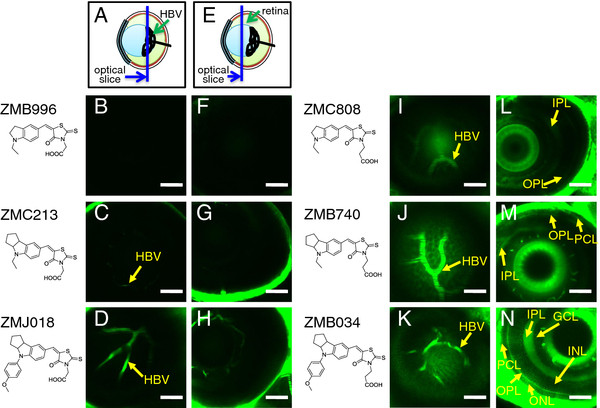Fig. 2 In vivo assessment of the permeability of the BRB to fluorescent IDs. Zebrafish larvae (albino line) at 7–8 dpf were immersed in egg water containing 1 μM of ID. In vivo fluorescence imaging of the zebrafish retina was performed using a CLSM. Schematic diagram (A and E) showing the region of the eye containing the HBV (B-D, I-K) and multiple layers of retina (F-H, L-N) observed using the CLSM. B-D and F-H: In vivo fluorescence imaging of zebrafish larvae stained with IDs possessing a rhodanine ring with an acetic acid group (ZMB996, ZMC213, and ZMJ018, B and F, C and G, D and H, respectively). The HBV in zebrafish stained with ZMJ018 were clearly visualized. I-N: In vivo fluorescence imaging of zebrafish larvae stained with IDs possessing a rhodanine ring with an propanoic acid group (ZMC808, ZMB740, and ZMB034, I and L, J and M, K and N, respectively). Both the HBV and multiple layers of retina were clearly visualized in zebrafish stained with ZMB034. Bar: 50 μm. HBV, hyaloid blood vessel; IPL, inner plexiform layer; OPL, outer plexiform layer; PCL, photoreceptor cell layer; GCL, ganglion cell layer; INL, inner nuclear layer; ONL, outer nuclear layer.
Image
Figure Caption
Acknowledgments
This image is the copyrighted work of the attributed author or publisher, and
ZFIN has permission only to display this image to its users.
Additional permissions should be obtained from the applicable author or publisher of the image.
Full text @ BMC Neurosci.

